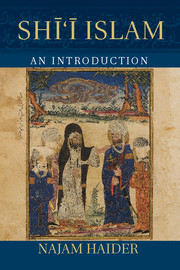Book contents
- Frontmatter
- Dedication
- Contents
- List of Tables and Maps
- Acknowledgments
- Note on the Cover Image
- A Note on Transliteration and Dating
- Maps
- Introduction
- Section 1 Theology
- Section 2 Origins
- Section 3 Constructing Shī‘ism
- Section 4 Shī‘ism in the Modern World
- Appendix Verses Mentioned in the Argument from Qur’ānic Expectations in Chapter 3
- Index
- References
Introduction
Published online by Cambridge University Press: 05 August 2014
- Frontmatter
- Dedication
- Contents
- List of Tables and Maps
- Acknowledgments
- Note on the Cover Image
- A Note on Transliteration and Dating
- Maps
- Introduction
- Section 1 Theology
- Section 2 Origins
- Section 3 Constructing Shī‘ism
- Section 4 Shī‘ism in the Modern World
- Appendix Verses Mentioned in the Argument from Qur’ānic Expectations in Chapter 3
- Index
- References
Summary
In 1998, I was living in Syria and studying Arabic at the language center of the University of Damascus. I had also arranged classes in Islamic law in Sayyida Zaynab, a small suburb of Damascus built around an important Shī‘ī shrine, which contained a number of formal schools for the training of Shī‘ī religious scholars. The Muslim month of fasting (Ramaḍān) that year fell in January. Ramaḍān is a festive month in which Muslims abstain from food, water, and sex each day from sunrise to sunset. I often broke my fast in Sayyida Zaynab, as many schools would open their doors to the public near sunset and provide free food and drink. After the evening prayer, a scholar would offer a small talk centered on ritual or theology in simple Arabic that even I (as a student) could understand with little difficulty.
One day, the talk was given by an extremely distinguished scholar who was in Damascus representing a prominent Iranian Grand Ayatollah (the most senior scholarly title in Twelver Shī‘ism). He began by identifying the five central pillars of Shī‘ī Islam (these are discussed further in subsequent chapters) as (i) the belief in one God, (ii) the belief in Muḥammad as the last Prophet, (iii) the belief in the Day of Judgment, (iv) the belief that God is just in a manner humans can rationally understand, and (v) the belief in Imāms, divinely inspired leaders descended from the Prophet. The first three pillars were foundational to Islam and anyone who accepted them was unquestionably a Muslim. This meant that all Sunnīs were Muslims and had to be treated as coreligionists rather than as apostates or heretics. The acceptance of the final two pillars established that an individual was not just a Muslim but a Shī‘ī Muslim as well. The scholar marked this distinction through the use of the term “believer.” Both Sunnīs and Shī‘a were Muslims. The Shī‘a, however, were also “believers,” which placed them in a more select category with access to a greater truth.
- Type
- Chapter
- Information
- Shi'i IslamAn Introduction, pp. 1 - 12Publisher: Cambridge University PressPrint publication year: 2014



